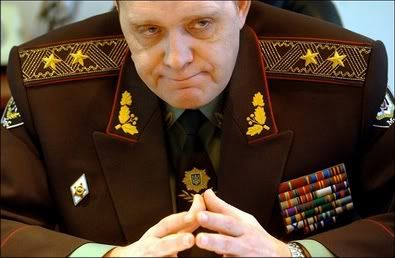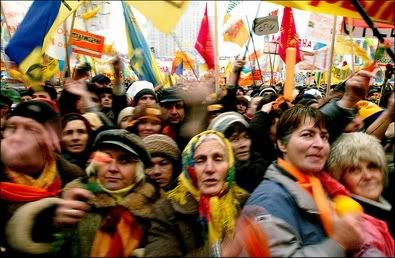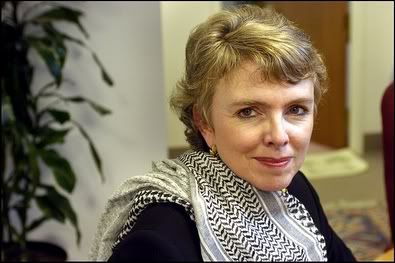The Russians Are Coming
The FBI is concerned about Moscow's growing number of spies. What secrets are they looking for?
TIMOTHY J. BURGER / BRIAN BENNETT TIME
At Los Angeles International Airport two weeks ago, FBI agents arrested an Irish businessman they had spent a week tailing all over California's Silicon Valley, from the offices of two electronics manufacturers in Sunnyvale to a hotel in Mountain View and down a quiet cul-de-sac to a suburban house in San Jose. The technology exporter, according to court papers, had purchased sophisticated computer components in the U.S. to send to Russia through Ireland. He now stands to be charged in mid-February with "unlawful export of 'defense articles.'" U.S. officials point to this little-noticed case as one manifestation of a troubling reality: although the cold war is long over, Russia is fielding an army of spooks in the U.S. that is at least equal in number to the one deployed by the old, much larger Soviet Union.
Russia runs more than 100 known spies under official cover in the U.S., senior U.S. intelligence and law-enforcement officials say. And those are just the more easily spotted spies working under the classic guise of diplomat. An unknown number of so-called nocs—who work under nonofficial cover as businessmen and -women, journalists or academics—undoubtedly expand the Russian spy force. "They're baaaaack," says a former senior U.S. intelligence official who worked against Moscow during the cold war. "They're busy as hell, but I don't think we've really got what it is that they're doing." The number of Russian spies in the U.S. is especially surprising, given that it was less than four years ago that the Bush Administration expelled 50 of them in retaliation for the humiliating discovery that FBI counterintelligence agent Robert Hanssen had been spying for Russia for 21 years.
In a high-level meeting late last year, officials tell TIME, the National Security Council instructed the FBI, CIA, State Department and other agencies to get a better handle on the Russian espionage threat. While the U.S. might like to eject suspect diplomats to force the Russians to send in their "rookies," as a U.S. official put it, Moscow would probably respond in kind, denting the CIA's corps in Russia.
As the FBI has remade itself in the wake of 9/11 into a counterterrorism agency, the bureau's long-standing counterintelligence mission has been bumped down a notch on the priority list. During this time, Russia has been among the U.S.'s rivals most aggressively exploiting the opening to build up its spying capabilities. Also, it has been using liberalized immigration rules for Russians, instituted after the cold war, to install nocs.
Officials say the Russians are after secrets about American military technology and hardware, dual-use technology such as the latest lasers, and the Administration's plans and intentions regarding the former Soviet states, China, the Middle East and U.S. energy policy, among other matters. Russia also wants to learn as much as possible about its biggest strategic worry: the U.S.'s ramped-up commitment to missile defense, which could eventually threaten Moscow's nuclear deterrent. Asked about the Russian spy surge, Russian embassy spokesman Yevgeniy Khorishko replied, "We do not comment on any of the issues concerning intelligence."
In addition to embassy-based spies, Russia—along with China, Pakistan, Iran and any number of other countries, including U.S. allies—relies on many hard-to-trace front companies, often run through third-party countries, to acquire secrets and dual-use technology. "We think there are thousands of these companies," a senior U.S. official said.
David Szady, the FBI's assistant director for counterintelligence, who is in charge of keeping tabs on foreign spies on U.S. soil, told TIME that in the next five years he wants to double the number of agents chasing spooks. Already, the FBI has placed counterespionage squads of at least seven agents in all 56 of its field division offices over the past year. What about the chance that damaging U.S. moles are helping Russia today? Says one U.S. senior intelligence official: "There's always evidence of another mole because there are always unexplained events. There are always unexplained losses. There are always enough dots that look strange."
— With reporting by Massimo Calabresi, Michael Duffy and Elaine Shannon/Washington
TIMOTHY J. BURGER / BRIAN BENNETT TIME
At Los Angeles International Airport two weeks ago, FBI agents arrested an Irish businessman they had spent a week tailing all over California's Silicon Valley, from the offices of two electronics manufacturers in Sunnyvale to a hotel in Mountain View and down a quiet cul-de-sac to a suburban house in San Jose. The technology exporter, according to court papers, had purchased sophisticated computer components in the U.S. to send to Russia through Ireland. He now stands to be charged in mid-February with "unlawful export of 'defense articles.'" U.S. officials point to this little-noticed case as one manifestation of a troubling reality: although the cold war is long over, Russia is fielding an army of spooks in the U.S. that is at least equal in number to the one deployed by the old, much larger Soviet Union.
Russia runs more than 100 known spies under official cover in the U.S., senior U.S. intelligence and law-enforcement officials say. And those are just the more easily spotted spies working under the classic guise of diplomat. An unknown number of so-called nocs—who work under nonofficial cover as businessmen and -women, journalists or academics—undoubtedly expand the Russian spy force. "They're baaaaack," says a former senior U.S. intelligence official who worked against Moscow during the cold war. "They're busy as hell, but I don't think we've really got what it is that they're doing." The number of Russian spies in the U.S. is especially surprising, given that it was less than four years ago that the Bush Administration expelled 50 of them in retaliation for the humiliating discovery that FBI counterintelligence agent Robert Hanssen had been spying for Russia for 21 years.
In a high-level meeting late last year, officials tell TIME, the National Security Council instructed the FBI, CIA, State Department and other agencies to get a better handle on the Russian espionage threat. While the U.S. might like to eject suspect diplomats to force the Russians to send in their "rookies," as a U.S. official put it, Moscow would probably respond in kind, denting the CIA's corps in Russia.
As the FBI has remade itself in the wake of 9/11 into a counterterrorism agency, the bureau's long-standing counterintelligence mission has been bumped down a notch on the priority list. During this time, Russia has been among the U.S.'s rivals most aggressively exploiting the opening to build up its spying capabilities. Also, it has been using liberalized immigration rules for Russians, instituted after the cold war, to install nocs.
Officials say the Russians are after secrets about American military technology and hardware, dual-use technology such as the latest lasers, and the Administration's plans and intentions regarding the former Soviet states, China, the Middle East and U.S. energy policy, among other matters. Russia also wants to learn as much as possible about its biggest strategic worry: the U.S.'s ramped-up commitment to missile defense, which could eventually threaten Moscow's nuclear deterrent. Asked about the Russian spy surge, Russian embassy spokesman Yevgeniy Khorishko replied, "We do not comment on any of the issues concerning intelligence."
In addition to embassy-based spies, Russia—along with China, Pakistan, Iran and any number of other countries, including U.S. allies—relies on many hard-to-trace front companies, often run through third-party countries, to acquire secrets and dual-use technology. "We think there are thousands of these companies," a senior U.S. official said.
David Szady, the FBI's assistant director for counterintelligence, who is in charge of keeping tabs on foreign spies on U.S. soil, told TIME that in the next five years he wants to double the number of agents chasing spooks. Already, the FBI has placed counterespionage squads of at least seven agents in all 56 of its field division offices over the past year. What about the chance that damaging U.S. moles are helping Russia today? Says one U.S. senior intelligence official: "There's always evidence of another mole because there are always unexplained events. There are always unexplained losses. There are always enough dots that look strange."
— With reporting by Massimo Calabresi, Michael Duffy and Elaine Shannon/Washington








